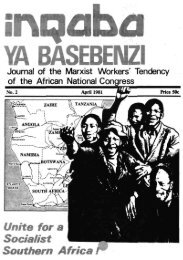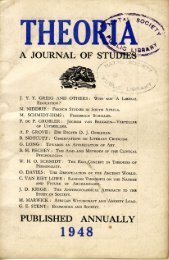Staffrider Vol.5 No.2 1982 - DISA
Staffrider Vol.5 No.2 1982 - DISA
Staffrider Vol.5 No.2 1982 - DISA
Create successful ePaper yourself
Turn your PDF publications into a flip-book with our unique Google optimized e-Paper software.
TRIBUTE TO CAN THEMBA<br />
STAN MOTJUWADI<br />
THE MAN FROM<br />
THE HOUSE OF TRUTH<br />
Talk had gone the rounds at Madibane High at Western<br />
Township that we would be getting a new teacher from<br />
Fort Hare who had obtained his B.A. with a distinction in<br />
English. As black matriculants grappling with irrelevant<br />
guys like Shakespeare, Milton and the vagaries of English<br />
poetry we felt that any black getting a distinction in English<br />
at university must be something out of this world. A<br />
phenomenon.<br />
You can imagine our disappointment when the principal<br />
Mr Harry Madibane proudly stood on the stage and introduced<br />
the new wonderboy. He was scrawny with an incongruously<br />
puffy, rubbery face. At my most generous, I would not say<br />
he looked a 'bit' distinguished. Sartorially he was a disaster.<br />
No tie, a cheap baggy grey workman's gaberdine trousers, a<br />
khaki shirt, shoes that had an overdue date with the repairers<br />
and the kind of jacket a fussy student would not be seen<br />
dead in. Quite a let down after the imposing figure we had<br />
over the days built up in our minds.<br />
Fortunately our disappointment was short-lived. From the<br />
moment he opened his mouth to address us, we were, to use<br />
a cliche, eating out of his bony palm. Blinking all the time<br />
like something unused to harsh lights, he spoke in a cool,<br />
sophisticated voice. He used words we were accustomed to,<br />
but he used them only the way he could. Eloquent, and<br />
articulate he really made the occasion his show without being<br />
pompous. On the contrary, he made us feel like his equals.<br />
This was my first encounter with Can Dorsay Themba.<br />
Can was to disappoint me once more. Although he didn't<br />
teach us, our own English teacher had a great respect for<br />
him. So before we sat for our final exams, he asked Can<br />
to test us in essay writing. He gave us the subject, The<br />
poetry of the earth is never silent.<br />
I went all out to please the man from Fort Hare, pulling<br />
out all the stops.<br />
When the scripts came back, the first thing I looked for<br />
was Can's remarks at the end of what I regarded as my<br />
magnum opus.<br />
'The poetry of your earth is ever silent,' was Can's verdict.<br />
Can, however, more than made up for it a few years later<br />
when he asked me to join him on Post where he was news<br />
editor and later assistant editor.<br />
To be invited by Can, who was rated among the top black<br />
writers was, for me like being granted the freedom of the<br />
city.<br />
In spite of the respect and awe he was held in as a writer,<br />
Can proved to be the most prosaic person I'd ever met. At<br />
lunchtime he would send to the chinaman around the corner<br />
for pork bones and some slices of bread.<br />
It may sound a bit unAfrican for me to be referring to<br />
someone older than me and my former teacher at that, by his<br />
first name, but Can in his own vain manner had an answer for<br />
this. As he used to say: 'Have you ever heard of Mr Jesus, or<br />
Mr Shakespeare?<br />
Can loved company and he was superb company himself.<br />
A sparkling conversationalist with razor-sharp repartee. But<br />
what stands out in my mind is the day editor Arthur Rudolph<br />
found Can snoring on his desk, dead drunk. Arthur warned<br />
Can that the next time he found him drunk on the job he<br />
would fire him. Can lifted his head, looked at Arthur through<br />
bleary eyes.<br />
'Yes, promises, promises, promises. That's all a guy can<br />
get in this place,' Can slurred, dropped his head once more<br />
on the desk and continued with his snoring.<br />
Until he met his charming wife Can never discriminated in<br />
the kind of girl he fancied. Once I had to object when he<br />
came along touting a tatty scrubber.<br />
'Voetsek,' he said. 'Who am I to question what the gods<br />
give.'<br />
At the time he had a pad in Sophiatown we called The<br />
House of Truth. The place perhaps was Can's way of cocking<br />
a snook at snobbery, officialdom and anything that smacked<br />
of the formal. Everybody but the snob was welcome at The<br />
House of Truth. You did not have to have permission to<br />
bunk with your date on the only single bed in the room. Can<br />
would stagger in in the early hours of the morning and pass<br />
out in a corner on the floor.<br />
Can was vain. But his was the kind of healthy, innocent<br />
vanity of a child. Like the time he rushed up to my desk with<br />
a hardcover book.<br />
'Look,' he showed me the index of the book. There were<br />
the names of well-known writers.<br />
'And look here.' There was the name, Can Themba.<br />
'Yes boy, at last immortality has caught up with me,' he<br />
gave that laugh of his that rocked his disjointed frame.<br />
Although the Writers Association of South Africa<br />
honoured him with the Henry Nxumalo Award for his contribution<br />
to journalism, Can was never a legman. For him,<br />
slogging it out in search of news bordered on the mundane.<br />
He was essentially a writer.<br />
He fell four-square on the definition of a poet as<br />
somebody who can give to airy nothing a local habitation<br />
and a name. Yes, Can could write about nothing and anything<br />
and make it pleasant reading.<br />
Like one day when Sir Tom Hopkinson, former editor of<br />
Drum, approached the chief sub.<br />
'Look, I don't know what Can is writing about. I don't<br />
know what he is trying to say, but it is mighty good prose.<br />
We must use it,' Sir Tom said. Can was an erratic genius. He<br />
had many faults but at times he reminded me of a song we<br />
used to sing as kids at Sunday school. 'Look them up. Get<br />
them gone. All the little rabbits in the field of corn. Anger,<br />
envy, jealousy, pride. These must never in my heart abide.'<br />
Can never had any of these rabbits.<br />
One of Can's greatest weaknesses was his rhino thirst. This<br />
is what prompted one writer to say that Can didn't die from<br />
natural causes, but died from drowning. Tragic.<br />
His only legacy to posterity is a book aptly entitled: 'The<br />
Will to Die.' Apt because the way Can lived gave the<br />
impression that he had a death wish.<br />
We'll all remember Can. #<br />
STAFFRIDER, VOL. 5 NO. 2, <strong>1982</strong> 41
















